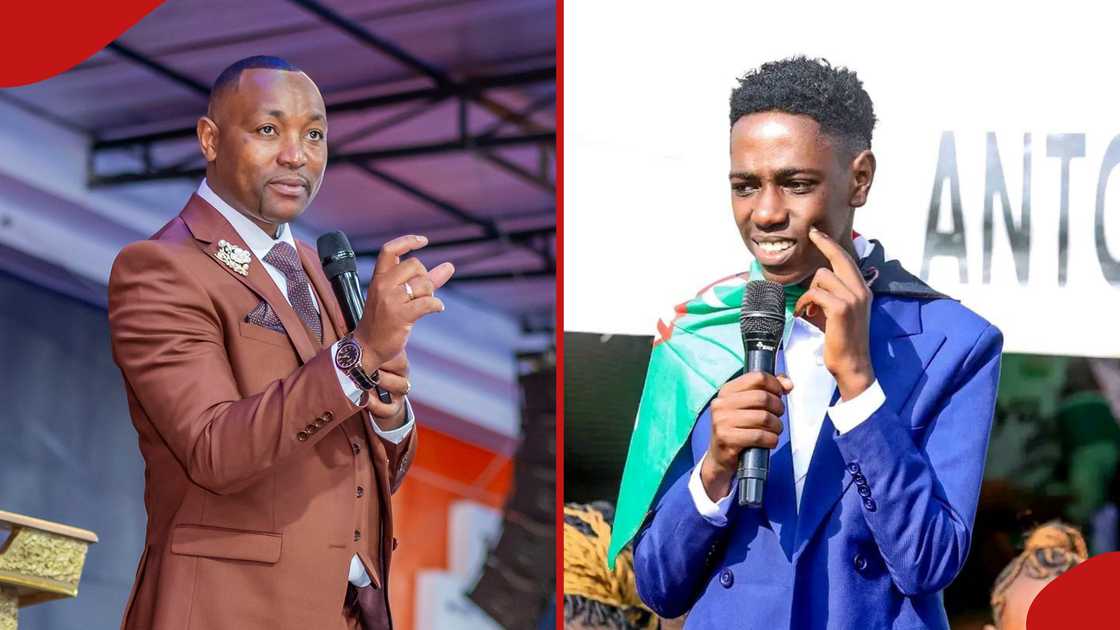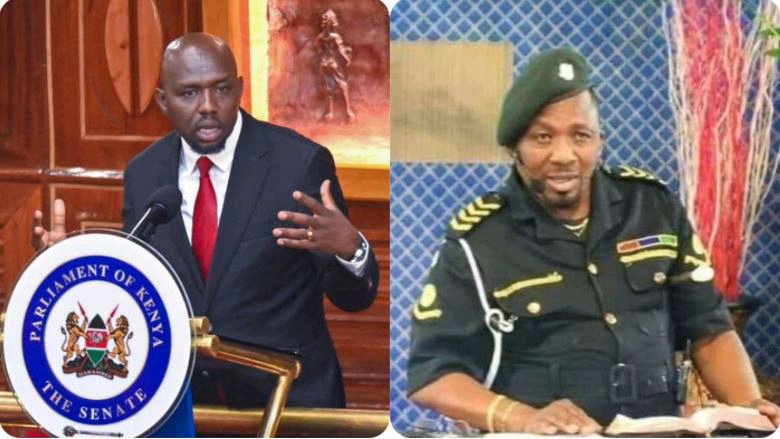On Sunday, October 5, 2025, thousands of Kenyans gathered at JCM Church in Ruiru, where Bishop Ben “Muthee” Kiengei made a public announcement that would dominate headlines and social media feeds for days. He declared that Vincent “Kaluma Boy” Kagwi, the 17-year-old TikTok creator who captured national sympathy after sharing videos of himself caring for his bedridden father, had been offered a full university scholarship.
According to The Star, Bishop Kiengei told congregants that East African University Vice Chancellor, Dr. Christopher Mutembei, had personally confirmed the award. The scholarship, Kiengei said, would allow Kaluma to study Sales and Marketing, equipping him with digital skills to sustain his newfound fame.
The Public Moment
As reported by Kenyans.co.ke, the JCM thanksgiving service quickly turned into a nationwide show of generosity. Moved by Kaluma’s story, Kenyans raised over KSh 2 million within half an hour to support his mother’s business venture. The Bishop later stated that these funds would help the family become self-reliant through what he termed “Kaluma’s Boy Enterprise.”
In the same breath, Kiengei explained that the scholarship had come through his intervention after the viral TikTok clips caught the attention of several institutions and sponsors. The church, however, maintained that it was not directly handling the donations, noting that transparency and accountability would rest with the family, according to Kenyans.co.ke.
During the event, Kiengei shifted into Kikuyu to connect emotionally with the crowd, saying, “Mundu mwega ndaarĩ na indo, no niwe mwega.” (A good person is not defined by what they have, but by who they are.) The congregation broke into applause as he urged Kenyans to extend kindness without expecting returns, adding that helping Kaluma was a “call of humanity, not publicity.”
Pull quote: “Mundu mwega ndaarĩ na indo, no niwe mwega,” said Bishop Kiengei, reminding the congregation that true goodness comes from one’s character, not material wealth.
Leaked Chats and Additional Promises
Days later, Tuko.co.ke published an article quoting leaked WhatsApp messages that Kiengei himself shared online. In those screenshots, purportedly between him and East African University officials, the university allegedly promised accommodation, monthly pocket money, and even a work–study role for Kaluma within the institution’s digital team.
One of the messages reportedly read, “We will accommodate him and give him monthly pocket money,” while another promised to help him “develop his digital marketing skills through university platforms.”
While such messages painted an inspiring picture, Tuko and Citizen Digital both noted that the authenticity and formalization of those agreements remained unverified, pending official documentation from the university.
What Remains Unclear
Despite the heartwarming narrative, several unanswered questions remain.
Was the scholarship formally documented?
According to The Star, no official scholarship letter or signed contract has been made public. A verbal or on-stage commitment does not carry the same legal weight as a written, institution-backed award.
Who is financing the scholarship?
It is unclear whether the support originates directly from the university, a private donor, or through the church’s initiative. Kenyans.co.ke reported that Bishop Kiengei facilitated the process but did not contribute funds himself.
Has Kaluma met university admission requirements?
Being 17 years old, Kaluma might still be completing his secondary education. There are no public records either from TEAU or Kenya’s Ministry of Education confirming whether the scholarship is immediate or deferred until he attains entry qualifications.
Where are the public donations held?
With millions raised through church events and online drives, Kenyans online have been demanding clarity on who holds the money and how it will be managed. As of this week, neither the church nor the family has publicly released financial statements.
Do the leaked messages represent binding plans?
The university has yet to issue an official press statement confirming or denying the details contained in the screenshots shared by Bishop Kiengei. Until that happens, those messages remain claims, not confirmed commitments.
Why This Matters
For Kaluma, the promise of higher education represents hope beyond viral fame, a chance to convert sympathy into stability. But if promises go undocumented or funds mismanaged, the young TikToker risks being yet another victim of fleeting online philanthropy.
For East African University and JCM Church, transparency is equally critical. Public institutions and faith-based leaders must demonstrate that such grand gestures are backed by formal agreements, not photo opportunities.
As media analyst Dennis Otieno told Citizen Digital, “Good intentions must be accompanied by paperwork. Otherwise, we are building castles in the air.”
The Way Forward
An investigative follow-up should seek to obtain a signed scholarship award letter and admission offer from East African University, verify whether the university council or donor board sanctioned the sponsorship, and request public disclosure of the KSh 2 million raised, including receipts and bank custodianship.
Journalists should also interview Bishop Kiengei and Dr. Mutembei on how and when Kaluma will begin his studies, and authenticate the leaked chat screenshots to confirm whether their promises are enforceable.
According to reports by The Star, Kenyans.co.ke, and Tuko.co.ke, the story of Kaluma Boy and Bishop Muthee Kiengei is as inspiring as it is instructive. It captures Kenya’s growing culture of digital empathy, where ordinary citizens can rally around a cause within hours.
Yet it also exposes the delicate line between goodwill and accountability. Until official documents are produced and funds accounted for, the “Kaluma Boy scholarship” remains more a promise than a policy, a hopeful beginning that Kenya must watch closely to ensure it ends well.
Reflecting on the larger picture, this story is a reminder: in a nation where viral compassion often fades faster than the next trending video, perhaps what Kenya needs most is consistency in kindness, not just moments of it.



